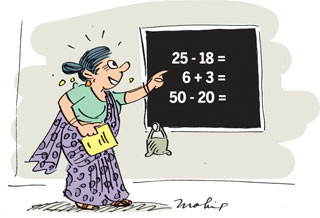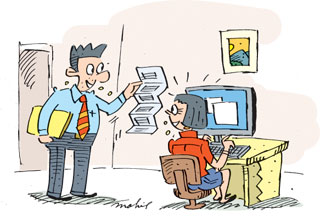|
 by R. S. Karunaratne by R. S. Karunaratne
Adverbs of manner and place
We use adverbs to describe verbs. Most adverbs are formed by adding
‘ly’ to adjectives.
The engineer measured the bridge accurately.
Kalpana performed splendidly at the drama competition.
The relatives watched sadly as the coffin was removed from the house.
|

The teacher explained the sum accurately. |
The principal praised the teacher for teaching her students efficiently.
Mary does not care to dress properly for work.
Some adverbs do not take the ‘ly’ ending.They have the same form as
adjectives.
He drives fast when there is no traffic on the road.
Nilmini worked hard to pass the examination.
The local politician came late for the meeting.
I didn’t have to wait long for the train.
The protesters marched straight to the company director’s office.
An adverb of manner tells us how something is done. We place adverbs
of manner usually at the end of a sentence.
The soldiers fought gallantly.
The teacher explained the sum accurately.
The police searched the house thoroughly.
The management trainees learned the office routine efficiently.
All of us listened to the lecturer attentively.
Sometimes we use adverbs of manner at the beginning of a sentence for
emphasis.
Happily Nethmi ran out to welcome her friends.
Carefully my grandmother crossed the road.
Painfully Sam sat on the pavement after the accident.
Sadly we watched the building crumbling down.
|

John ran inside the house to escape from the ferocious dog. |
Merrily the children sang and danced on the stage.
An adverb of place tells us where somebody or something is. We
usually use adverbs of place after the main verb.
John ran inside the house to escape from the ferocious dog.
The boys moved upstairs.
Anne went abroad but did not stay there long.
We all ran downstairs to welcome the guest.
How long can you stay underwater?
If there is an object in a sentence, we use the adverb of place after
it.
Nayana looked for her pen everywhere.
The chef grilled fish at the hotel.
He stopped the vehicle somewhere to have breakfast.
I have seen you somewhere.
We could not find accommodation there.
Current English usage :
Current English usage aims to provide an easy method of reference for
those who wish to write good English. The entries deal with points of
grammar, punctuation, style, idiom, spelling and modern usage.
1. Add up to is a piece of modern jargon that means ‘amounts to’. It
may be used in colloquial expressions but not in formal writing.
2. Addicted
We often hear “He is addicted to drink.” This is unidiomatic because
‘addicted to’ is followed by a noun or gerund. Say, “He is addicted to
liquor / drugs / gambling.”
3. Adopted parents is incorrect. Say ‘adoptive parents’. But we can
say ‘adopted child / son / daughter.’
4. Ago normally takes the past tense as it refers to a point of time
in the past. My mother died ten years ago.
5. Aim
It is idiomatically correct to say, “He is aiming at saving a lot of
money.” However, ‘aims to’ is gaining ground. “This column aims to give
an outline of grammatical rules.”
6. Alias
In Latin, ‘alias’ means ‘at another time’. In English, however, it
means ‘an assumed name by which a person is known.’ Simon alias
Navariyan was arrested by the police. The plural of ‘alias’ is
‘aliases.’
7. Alibi in Latin means ‘elsewhere’. It does not mean an excuse or a
justification. The word is mostly used in legal language.
8. Allergic is a medical term meaning ‘highly sensitive to certain
substances.’ It does not mean ‘a strong dislike.’ So, it is incorrect to
say, “I am allergic to politicians.”
9. Allusion/illusion
‘Allusion’ is a passing reference. ‘Illusion’ is a deceptive
appearance.
10. Already/all ready
‘Ready’ means ‘prepared.’ However, ‘already’ and ‘all ready’ have
different meanings. Are you all ready to start? When I got into the car
the driver was already at the wheel.
11. Alright/all right
‘Alright’ is non-standard. Always use ‘all right’. Is it all right
for me to sit here?
12. Always/all ways
‘Always’ means ‘at all times.’ Mother always loves her children. ‘All
ways’ means ‘in every possible way.’ I tried all ways to get a job.
13. Amenable is always followed by the preposition ‘to’ and a noun. I
am happy my children are amenable to discipline.
14. Amend/emend
‘Amend’ means ‘to alter’. ‘Emend’ means ‘to correct an error.’
15. Among/amongst
Although there is no difference in meaning, both words should be
followed by a plural noun or pronoun. Distribute the sweets among the
children. There is unity amongst the clergy.
Starters:
Questions dealing with duration of time
Very often we are compelled to ask "How does it take?" in certain
situations. The question is usually answered with "It takes...".
How long does it take by train from Panadura to Colombo Fort?
It takes one hour by train from Panadura to Colombo Fort.
How long does it take by car from your house to office?
It takes half an hour by car from my house to office.
How long does it take to cross the Kelani River?
|

How long will it take to type this letter? |
It takes ten minutes to cross the Kelani River.
How long does it take to learn driving?
It takes two weeks to learn driving.
How long does it take to walk from one end of the park to the other end?
It takes 15 minutes to walk from one end of the park to the other end.
Questions in the past tense are formed in the following way.
How long did it take by train from Dehiwala to Wellawatte?
It took ten minutes by train from Dehiwala to Wellawatte.
How long did it take by car from your house to school?
It took 15 minutes by car from my house to school.
How long did it take to cross the Bolgoda River?
It took 20 minutes to cross the Bolgoda River.
How long did it take to learn driving?
It took two weeks to learn driving.
How long did it take to walk from one end of the park to the other end?
It took 15 minutes to walk from one end of the park to the other end.
Questions in the future tense are formed in the following manner.
How long will it take to type this letter?
It will take 20 minutes to type it.
How long will this letter take to reach the destination?
It will take two days to reach the destination.
How long will it take to learn typing?
It will take three months to learn typing.
How long will it take to learn basic English?
It will take about two years to learn basic English.
How long will it take to reach the bus stand?
It will take 10 minutes to reach the bus stand.
[Activity]
Read the following sentences and form questions with "How long did it
take...?" Check your answers with the key.
1. Maya found a job.
.....................................................
2. I walked to school.
.....................................................
3. The children cleaned the classroom.
.....................................................
4. Priya learnt to drive.
.....................................................
5. Reggie found an apartment.
.....................................................
6. Lionel built a house.
.....................................................
7. Krishna played volleyball.
.....................................................
8. Namasivayam wrote a letter to his manager.
.....................................................
9. Champa swam across the Mahaweli river.
.....................................................
10. Amanda walked to the station.
.....................................................
--------------------------------
[Key]
1. How long did it take for Maya to find a job?
2. How long did it take for you to walk to school?
3. How long did it take for the children to clean the classroom?
4. How long did it take for Priya to learn driving?
5. How long did it take for Reggie to find an apartment?
6. How long did it take for Lionel to build a house?
7. How long did it take for Krishna to play volleyball?
8. How long did it take for Namasivayam to write a letter to his
manager?
9. How long did it take for Champa to swim across the Mahaweli River?
10. How long did it take for Amanda to walk to the station?
Letters and sounds
It is interesting to know how letters change their sounds. For
instance, in the following words, the letter ‘T’ makes one sound:
Tin, tank, pat, take, ticket, toilet, transfer, trophy, trade, tail,
tale, towards, tirade, tornado, taxi, let, bet, cut, put and cat etc.
When combined with ‘H’, ‘T’ makes a different sound: Thank, thin, path,
pathology, ruthless, Thursday, this, those, that, thunder, think and
thought etc.
In the following words the letter ‘G’ makes a hard sound:
Girl, game, rug, get, got, go, gone, government, guise, guy etc. In
the following words G’ makes a soft sound similar to ‘J’: Germ, ginger,
page, giant, margarine, gem etc.
In the following words ‘S’ gives a hissing sound: See, sit, sister,
gas, pass, Sun, son, seem, soak, sell, sound, sold, season, safe,
summer, solid, sink, soap etc.. However, ‘S’ makes a buzzing sound in
certain words: has, his, pleasant, vast, yes etc.
Some sounds are created by the combination of different letters:
March, alms, clerk, heart, bath, last, fast, cart etc.
Note the vowel sounds in the following words: Aisle, guy, might, rye,
paid, day, grey, neigh etc.
‘F’ sound is sometimes represented by different letters:
Photograph, graph, rough, laugh, cough, enough etc.
‘J’ sound is represented by different combinations of letters: Gem,
gemmology, edge, jam, giant, ledger etc.
‘K’ sound is created by different letters: Cap, dark, plaque, custody
etc.
For words borrowed from French we use ‘CH’ to produce the ‘SH’ sound:
Chalet, chauffeur etc.
For words borrowed from Greek we use ‘PH’ to produce the ‘F’ sound:
Telephone, physical, photograph, philosophy, phenomenon, phase etc.
For words borrowed from Japanese we use ‘K’ to produce the ‘C’ sound:
Karaoke, karate, kimono etc. |

